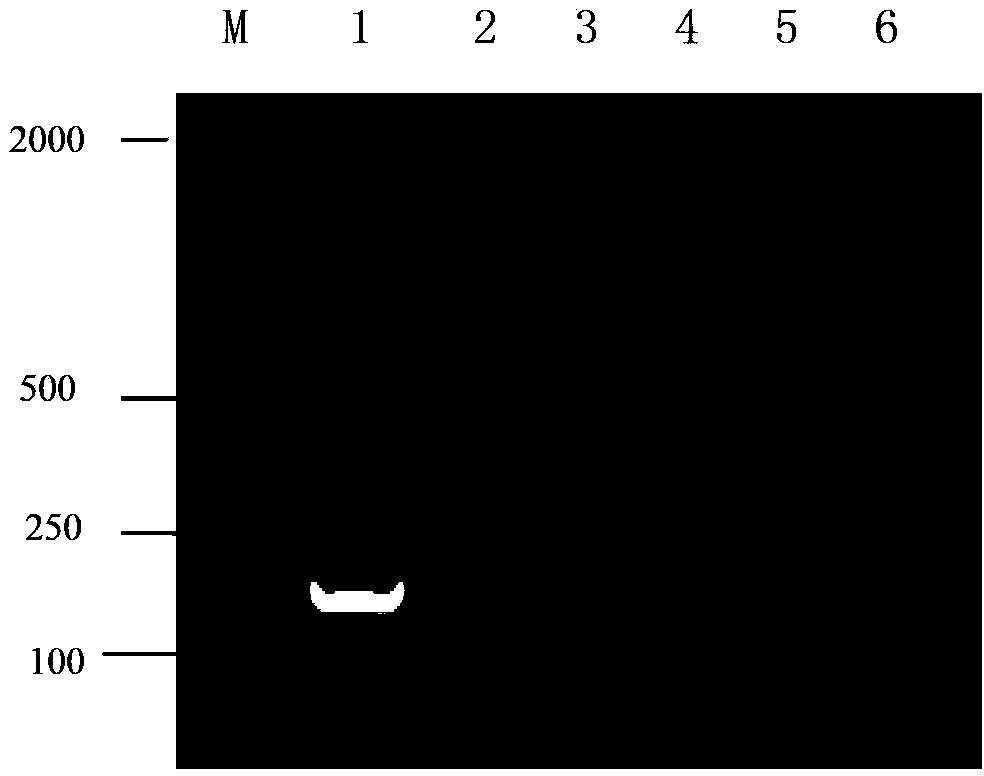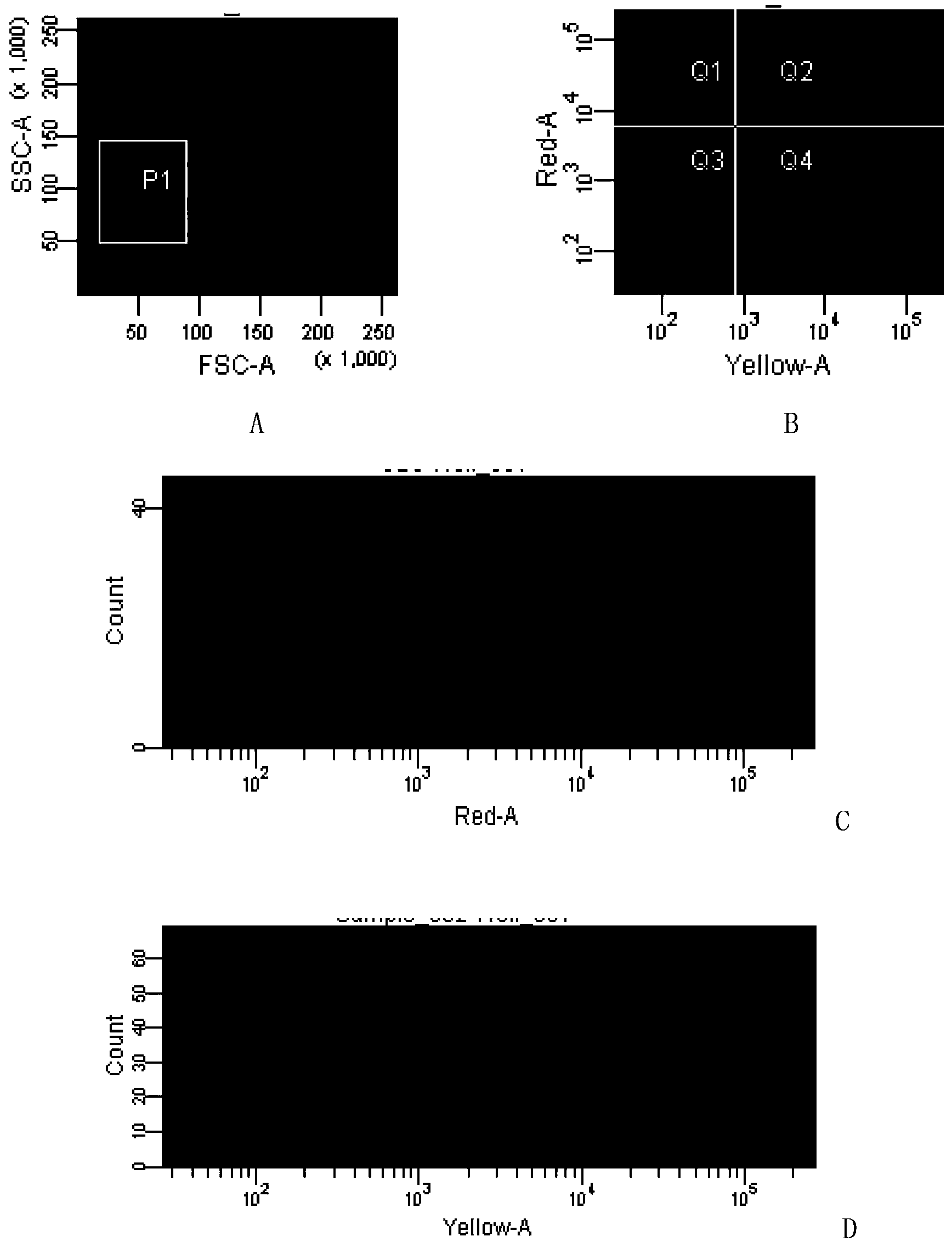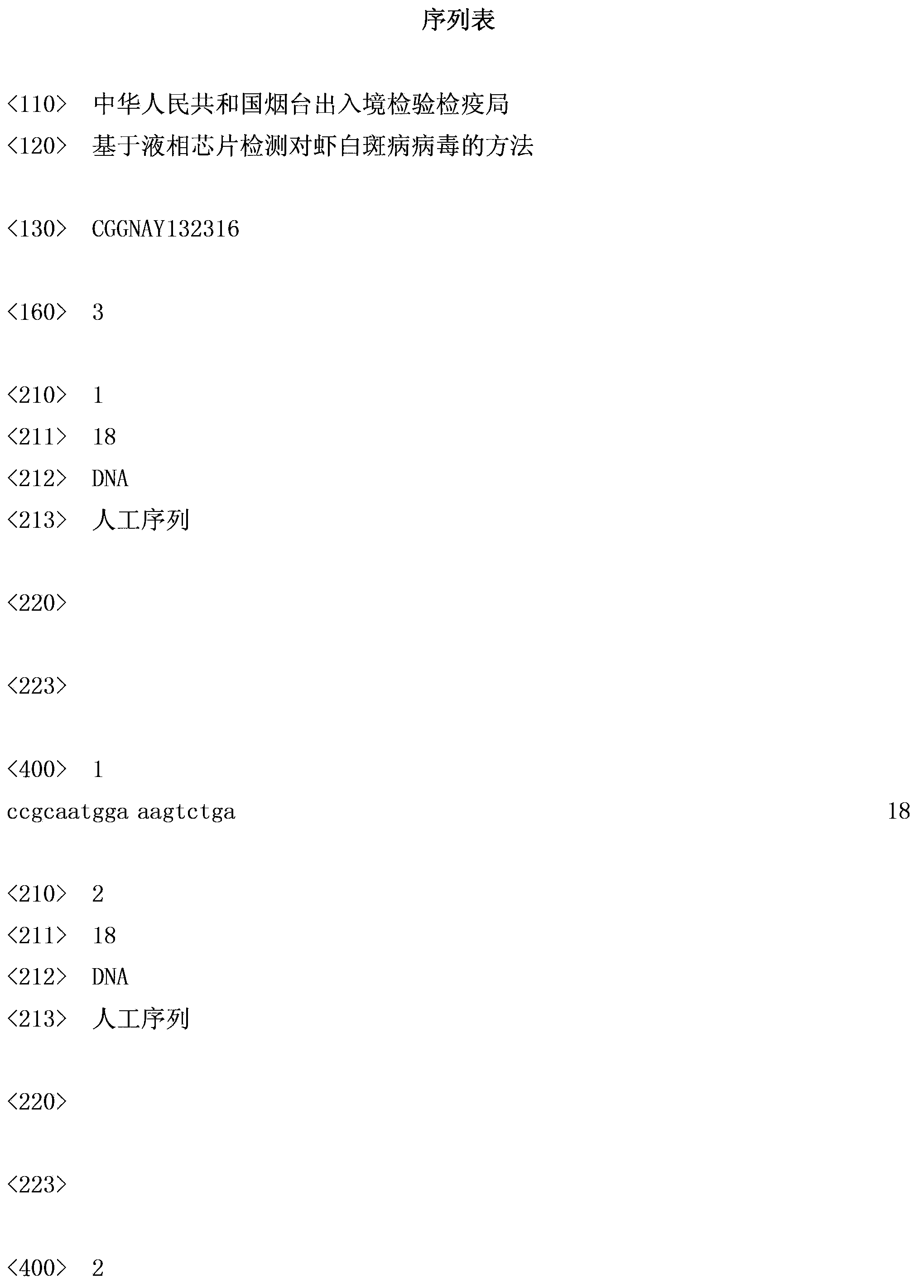Method for detecting shrimp white spot disease virus based on liquid chip
A technology for shrimp white spot disease and virus, which is applied in biochemical equipment and methods, microbial determination/inspection, DNA/RNA fragments, etc., can solve problems such as being unsuitable for the detection of a large number of samples, harmful to human body and environment, and cumbersome methods, etc. To achieve the effect of short time required, high sensitivity and no environmental pollution
- Summary
- Abstract
- Description
- Claims
- Application Information
AI Technical Summary
Problems solved by technology
Method used
Image
Examples
Embodiment 1
[0037] Example 1. Design of specific primer pairs and specific probes
[0038] Through a large number of sequence alignments and comparison of amplification effects, specific primer pairs and specific probes for amplifying shrimp white spot virus were designed.
[0039]The specific primer pairs are as follows (target sequence is 232bp):
[0040] F1 (Sequence 1 of the Sequence Listing): 5'-CCGCAATGGAAAGTCTGA-3';
[0041] R1 (Sequence 2 of the Sequence Listing): 5'-GGTGAAGGAGGAGGTGTT-3'.
[0042] The nucleotide sequence of the specific probe (Sequence 3 of the Sequence Listing) is as follows:
[0043] 5'-CTGATGCACAGATGAAGGAAGAAGA-3'.
Embodiment 2
[0044] Example 2. Application of specific primer pairs to assist in the identification of shrimp white spot virus
[0045] Shrimp white spot virus, epidemic hematopoietic organ necrosis virus, carp spring viremia virus, infectious hematopoietic organ necrosis virus and viral hemorrhagic septicemia virus were used as the test viruses to carry out the following experiments:
[0046] 1. Use a DNA extraction kit to extract the genomic DNA of the virus to be tested (shrimp white spot virus or epidemic hematopoietic necrosis virus).
[0047] 2. Using the genomic DNA obtained in step 1 as a template, using a primer pair composed of F1 and R1, using a PCR kit, and performing PCR amplification on a gradient PCR amplifier to obtain a PCR amplification product.
[0048] PCR amplification reaction system: In a 0.2mL PCR reaction tube, add 2.5μL of 10× PCR buffer, 2.0μL of dNTPs (2.5mmol / L each), 10pmol / μL F11μL, 10pmol / μL R11μL, Taq (5U / μL) ) 0.25 μL, genomic DNA 2.0 μL (about 300 ng), a...
Embodiment 3
[0056] Example 3. Application of primer-probe composition to assist in identifying shrimp white spot virus
[0057] 1. Preparation of primers and probes
[0058] Prepare the following primers and probes:
[0059] F2: 5'-biotin-CCGCAATGGAAAGTCTGA-3';
[0060] R2: 5'-biotin-GGTGAAGGAGGAGGTGTT-3'.
[0061] Probe T1: 5'-NH 2 - CTGATGCAACAGATGAAGGAAGAAGA-3'.
[0062] F2 was obtained by biotin labeling at the 5' end of F1, and R2 was obtained by biotin labeling at the 5' end of R1. Probe T1 is obtained by amination modification at the 5' end of the single-stranded DNA fragment shown in SEQ ID NO: 3 of the sequence listing.
[0063] 2. Establishment of liquid phase chip detection system
[0064] 1. Using a DNA extraction kit to extract the genomic DNA of shrimp white spot virus.
[0065] 2. Using the genomic DNA obtained in step 1 as a template, using a primer pair composed of F2 and R2, using a PCR kit, and performing PCR amplification on a gradient PCR amplifier to obtain a ...
PUM
 Login to View More
Login to View More Abstract
Description
Claims
Application Information
 Login to View More
Login to View More - R&D
- Intellectual Property
- Life Sciences
- Materials
- Tech Scout
- Unparalleled Data Quality
- Higher Quality Content
- 60% Fewer Hallucinations
Browse by: Latest US Patents, China's latest patents, Technical Efficacy Thesaurus, Application Domain, Technology Topic, Popular Technical Reports.
© 2025 PatSnap. All rights reserved.Legal|Privacy policy|Modern Slavery Act Transparency Statement|Sitemap|About US| Contact US: help@patsnap.com



